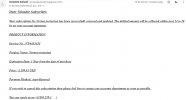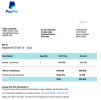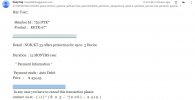britechguy
Well-Known Member
- Reaction score
- 5,067
- Location
- Staunton, VA
Just a few moments ago, this landed in my inbox:

Now why any even vaguely logical person would fall for this I cannot explain, but I know that they do. Every red flag that there could be is present on this one!
The main reason I'm posting is that I've received calls not about this specific scam, but clients who've recieved scam material "of the same form," in recent days. For example, one called me saying she'd gotten something like this saying she'd ordered an iPhone from Amazon, with a screen shot of an Amazon page enclosed. Luckily, she recognized it as a scam before having done anything stupid, but came mighty close (we've had the detailed, "What not to do and how to immediately recognize a scam," discussion again).
I'm just wondering if it's an "isolated incident" or if this may be the beginning of another wave of this type of scam? The do seem to occur in waves.

Now why any even vaguely logical person would fall for this I cannot explain, but I know that they do. Every red flag that there could be is present on this one!
The main reason I'm posting is that I've received calls not about this specific scam, but clients who've recieved scam material "of the same form," in recent days. For example, one called me saying she'd gotten something like this saying she'd ordered an iPhone from Amazon, with a screen shot of an Amazon page enclosed. Luckily, she recognized it as a scam before having done anything stupid, but came mighty close (we've had the detailed, "What not to do and how to immediately recognize a scam," discussion again).
I'm just wondering if it's an "isolated incident" or if this may be the beginning of another wave of this type of scam? The do seem to occur in waves.


